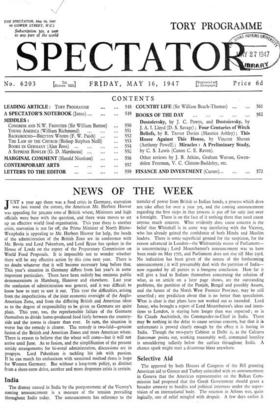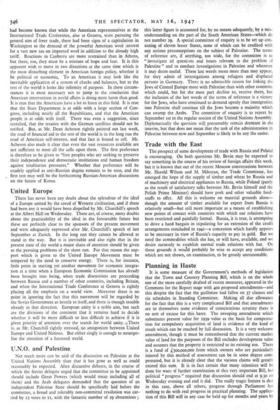Selective Aid
The approval by both Houses of Congress of the Bill granting American aid to Greece and Turkey coincided with an announcement in Geneva that the American representative on the Balkan Com- mission had proposed that the Greek Government should grant a broader amnesty to bandits and political internees under the super- vision of an international body. The reaction in Athens was, quite logically, one of relief mingled with despair. A few days earlier it had become known that while the American representatives at the International Trade Conference, also at Geneva, were pursuing the general aim of freer trade, there had been signs of a capitulation in Washington to the demand of the powerful American wool interest for a vast new tax on imported wool in addition to the already high tariff. Reactions in Canberra are more restrained than in Athens, but there, too, they must be a mixture of hope and fear. It is this apparent wish to move in two directions at the same time which is the most disturbing element in American foreign policy, whether it be political or economic, To an American it may look like the inevitable application of a system of checks and balances, but to the rest of the world it looks like infirmity of purpose. In these circum- stances it is most necessary not to jump to the conclusion that American intervention in world affairs is doing more harm than good. It is true that the Americans have a lot to learn in this field. It is true that the State Department is at odds with a large section of Con- gress, including nearly all the Republicans, and that the American people is at odds with itself. There was even a suggestion, since scotched, that the treaties with the German satellites should not be ratified. But, as Mr. Dean Acheson rightly pointed out last week, the road of financial aid to the rest of the world is in the long run the road of American self-interest, and that fact is bound to tell. Mr. Acheson also made it clear that even the vast resources available are not sufficient to meet all the calls upon them. The first preference is therefore to be given to "free peoples who are seeking to preserve their independence and democratic institutions and human freedom against totalitarian pressures." Whether that preference will be crudely applied as anti-Russian dogma remains to be seen, and the first test may well be the forthcoming Russian-American discussions on the future of Korea.



































